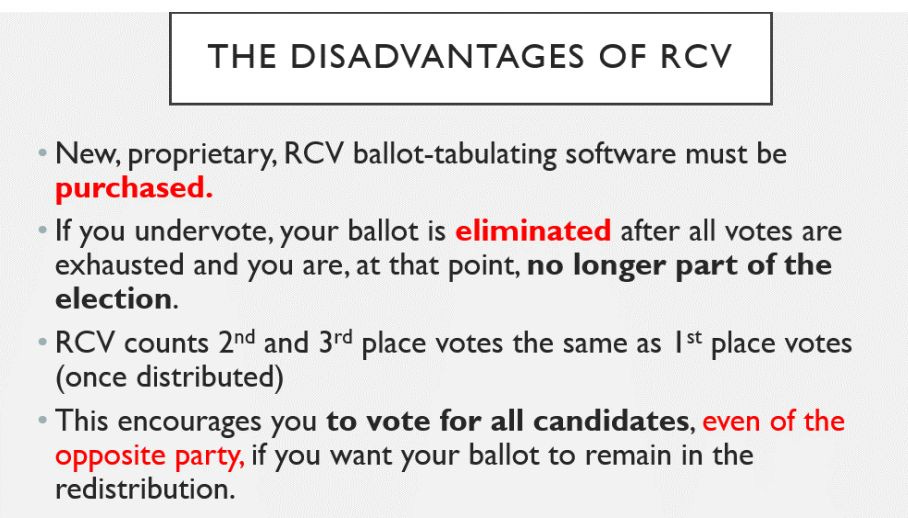August 22, 2024: Two-thirds of the Albemarle Electoral Board express concerns about ranked choice voting
Plus: A public meeting is coming up on September 10 for Pantops road improvements
What is the point of a newsletter that calls itself Charlottesville Community Engagement? What’s the reason a small company called Town Crier Productions exists to keep it going? Such big questions really are difficult to answer in the opening paragraph to another edition of a digital periodical that seeks to let people know a little about what decisions are made in local government in a rapidly changing community. I’m Sean Tubbs, and thanks for reading.
In today’s installment:
There’s a public hearing coming up on September 10 for a series of transportation projects on U.S. 250 at Pantops
The unincorporated area of Lovington in Nelson County will receive $2.2 million in federal funding to assist with rehabilitation of a municipal sewer system
Albemarle Board of Supervisors hear from two members of the Electoral Board about their opposition to ranked choice voting
First shout-out: Charlottesville E-bike Lending Library
In today’s first Patreon-fueled shout-out: The rolling topography of the Charlottesville area keeps some people away from choosing cycling as an option to get around. Perhaps an e-bike is in order?
That’s where Charlottesville’s eBike Lending Library comes in! E-bikes are a great way to get around the community but there are many brands and styles to choose from. Because many e-bikes are sold online, it can be a challenge to try an e-bike before buying one.
The Charlottesville E-bike Lending Library is a free, not-for-profit service working to expand access to e-bikes in the area. They have a small collection of e-bikes that they lend out to community members for up to a week, for free. You can experience your daily commute, go grocery shopping, or even bike your kids to school, and decide whether e-bikes are right for you. Check out this service at https://www.ebikelibrarycville.org!
Meeting scheduled on September 10 for Pantops road improvements
A lot of the transportation conversation in the Charlottesville area at the moment focuses on the ongoing work at the intersection of U.S. 29 and Hydraulic Road, but planning work continues for other areas with large amounts of traffic.
On Wednesday, Albemarle Supervisor Bea LaPisto-Kirtley had an announcement about a key milestone for another project happening on September 10. This one would take place on U.S. 250, a road that has a 2022 traffic count of 50,000 vehicles a day.
“There is a meeting by [the Virginia Department of Transportation] for the intersection of Pantops Corridor Improvements in Albemarle County,” LaPisto-Kirley said. “It’s a design public hearing so if you are located in the Pantops area or you work there, you may want to attend.”
This will take place at the Hilton Garden Inn at 1793 Richmond Road from 4:30 p.m. to 6:30 p.m. VDOT is required to hold public hearings for projects that are working their way from successful application to a finished improvement.
In this case, VDOT is planning to rebuild the existing intersection of U.S. 250, Virginia Route 20, and Riverbend Drive. The latter is the eastern border of the Pantops Shopping Center and leads to South Pantops Boulevard which serves as a parallel road to U.S. 250.
According to that traffic count, there are 8,600 vehicles that travel on Route 20 at this location.
Here’s some of what is proposed:
Route 20 and Riverbend Drive would both be adjusted to have a dedicated lane for both those turning right and driving through. There would be dual left-hand turn lane.
There will be an additional right-turn lane from westbound U.S. 250 into the intersection.
This project will also add a raised median on U.S. 250 between Route 20 and Hansen Road.
A new 300 foot long sidewalk would be built on the west side of Route 20.
The traffic signals will be adjusted and signage will be installed.
VDOT’s website on the project had details about the problems that the improvements seek to solve, including relieving congestion. There are safety issues as well.
“Most recent crashes in the vicinity were caused by left-turning traffic from the stop sign-controlled side streets along U.S. 250,” reads the website. “The added raised median along U.S. 250 between Route 20 and Hansen Road will help maintain free flowing traffic while improving safety.”
Materials for the meeting are not yet available on the website. A public comment period will end end on September 20, 2024. The purchase or acquisition of right of way will take place in 2025 and 2026 and the project will be advertised for bid in the spring of 2027. Construction would take place in fall of 2027 and be completed a year later.
“Project schedule is subject to change,” the website notes.
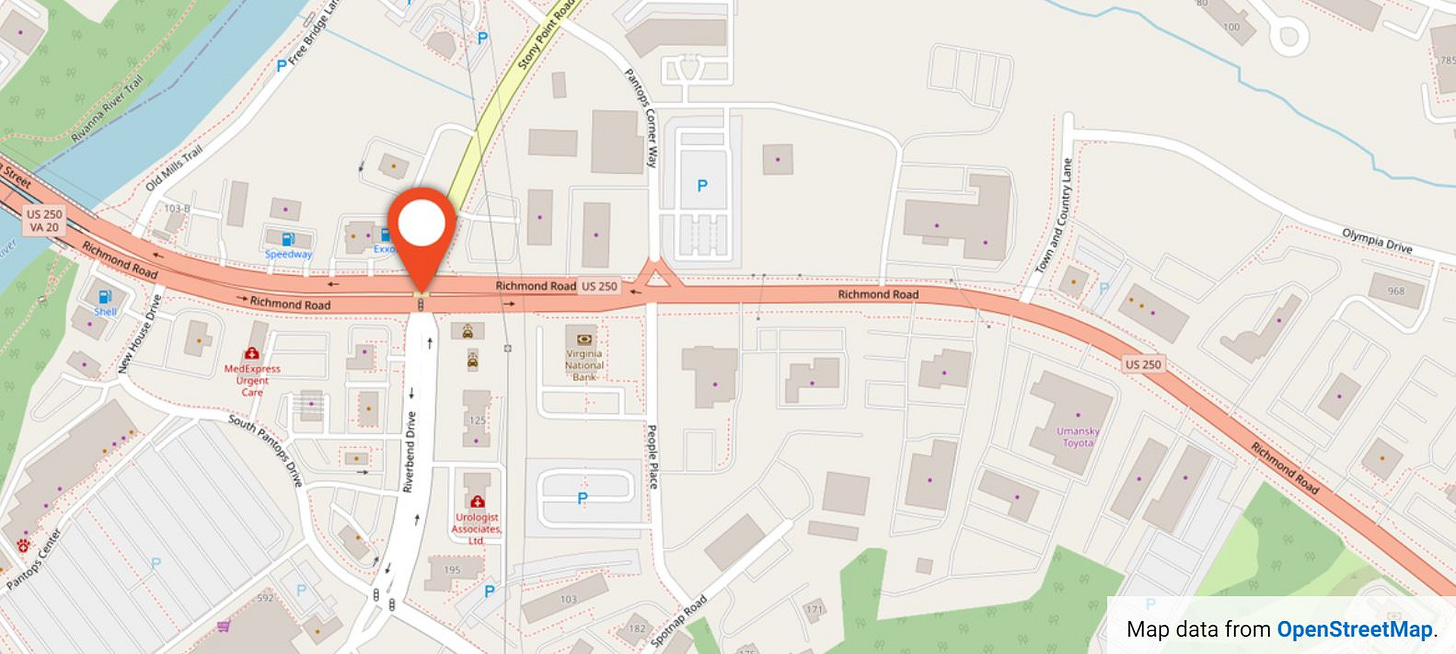
Federal funding announced for Lovingston sewer rehabilitation
A representative of the United States Department of Agriculture’s Rural Development traveled to Lovingston on Tuesday to commemorate a $2.2 million project to rehabilitate infrastructure installed in the wake of Hurricane Camille.
“A better place to live means you have access to clean and safe water, affordable housing, work, jobs, and schools,” said Diedre Robert, director of state office operations. “We stand here today as a symbol that, though we may have obstacles and disruptions, we stay, we rebuild, and we commit.”
Robert and a suite of dignitaries were on hand at the Nelson County Courthouse for the kickoff of a project that will replace or repair 8,000 linear feet of sewer pipe and 31 manholes that are part of a system put in place after Hurricane Camille caused damage. The Nelson County Service Authority took over the system in 1988.
In this case, the USDA’s Rural Utilities Service is providing a $641,000 bond to the Nelson County Service Authority and up to $1,594 million in grants. The Nelson County Board of Supervisors approved a support agreement for the project at their meeting on August 13. (learn more)
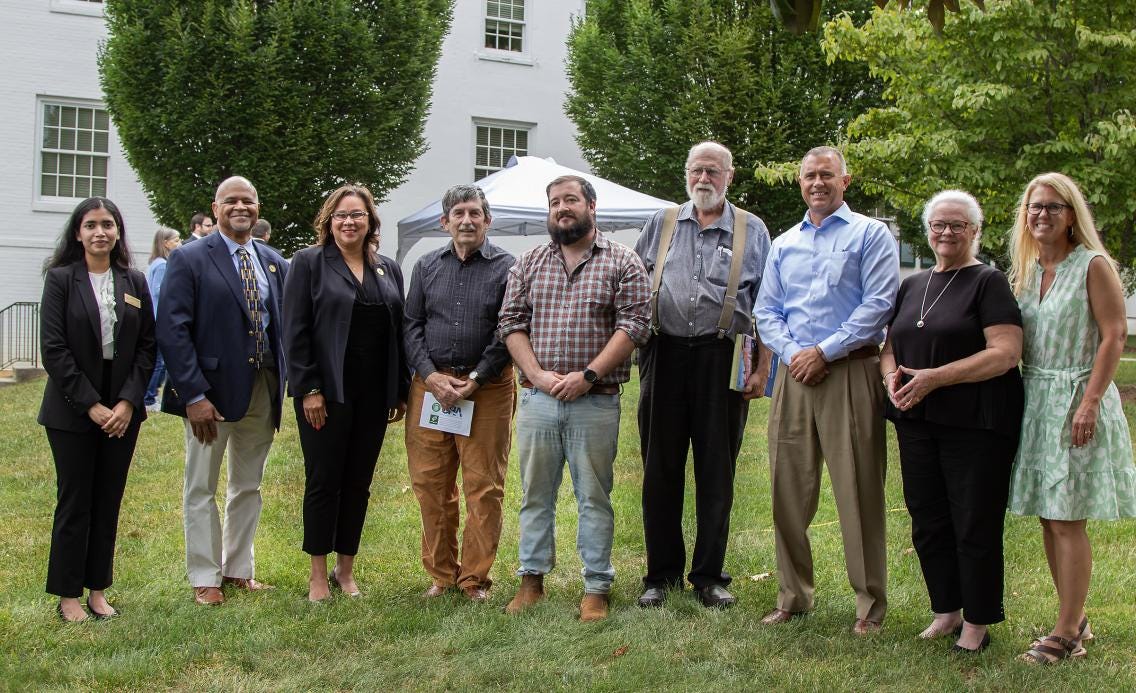
Second shout-out: Piedmont Master Gardeners have a newsletter
In today’s first subscriber-supported shout-out, the Piedmont Master Gardeners have a series of classes on Garden Basics up this fall beginning with Square-Foot Gardening on September 21. Before then, you can still learn a few things from their monthly newsletter called The Garden Shed.
Volume 10, Number 8 for August 2024 is currently out and has articles with relevant articles as the summer begins slightly to give way to fall. Learn about the Magic of Moths, Tall Perennials in the Landscape, and Weed Management.
There are also columns on edible and ornamental items that might have sprung up in gardens this July.
Take a look at the issue and another one will be along soon for September. And be on the lookout for classes as they fill up fast! There’s a lot more information at piedmontmastergardeners.org.
Both Republicans on Albemarle’s Electoral Board express concern about potential use of ranked-choice voting
Albemarle has six magisterial districts which each elect one Supervisor to serve as a representative on the county’s legislative body. Three seats are up for election in November 2025 and the county has a decision to make whether to follow the City of Charlottesville in allowing candidates in local elections to be selected through ranked choice voting.
In 2020, former Delegate Sally Hudson carried a bill to allow localities to use ranked choice voting for local offices. The legislation for the pilot project does not apply to state or federal office. The provisions also expire in 2031 when the bill sunsets. (view the legislation)
“The decision to conduct an election by ranked choice voting shall be made, in consultation with the local electoral board and general registrar, by a majority vote of the board of supervisors or city council that the office being elected serves,” reads the legislation.
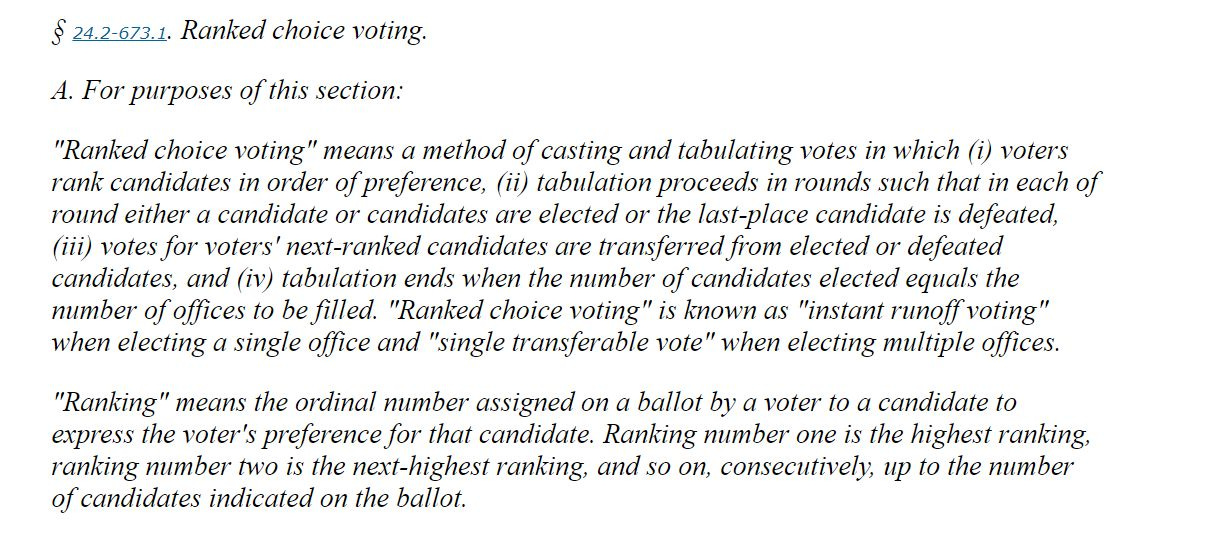
On August 21, the Albemarle Board of Supervisors got a briefing from both the registrar and two members of the Electoral Board. All across Virginia, the political party that occupies the Governor’s Mansion controls the majority on the electoral boards for all localities.
“Two electoral board members shall be of the political party that cast the highest number of votes for Governor at that election,” reads §24.2-106 of the Virginia Code.
Before the two presentations, several members of the public spoke to give their view on ranked choice voting, which allows voters to indicate first, second, third, or more choices for a candidate.
The first is a former member of the Albemarle County Electoral Board.
“Our current ballot system is simple and straight-forward,” said Nancy Muir. “It’s one person, one vote. Ranked choice voting is anything but simple and straight-forward.”

Muir claimed localities have to spend hundreds of thousands of dollars to educate the public about how the system works. She also said public trust in elections is already at a low point.
“Why should a new system of voting even be considered if the current system that is widely used is understood and working, whereas ranked-choice voting confuses voters, it creates distrust, and has caused decreased voter participation in a great many of the localities where it has been used?” Muir asked.
The only locality in Virginia that has officially used rank choice voting is Arlington County so there’s only one data point to measure that claim within the Commonwealth.
In 2023, the Democratic Primary had a turnout of 16.64 percent of the 173,619 registered voters in Arlington County. There were a total of 28,897 ballots cast. Susan Cunningham and Maureen Coffee won the two Democratic nominations that year in six rounds of voting. (view the details here)
In 2024, turnout dropped to 11.19 percent but the number of registered voters increased to 181,725. A total of 20,338 ballots were cast. Julius Spain Jr. won election to be the Democratic nominee for the one seat open on the County Board. Spain had been eliminated after the third round of voting in 2023.
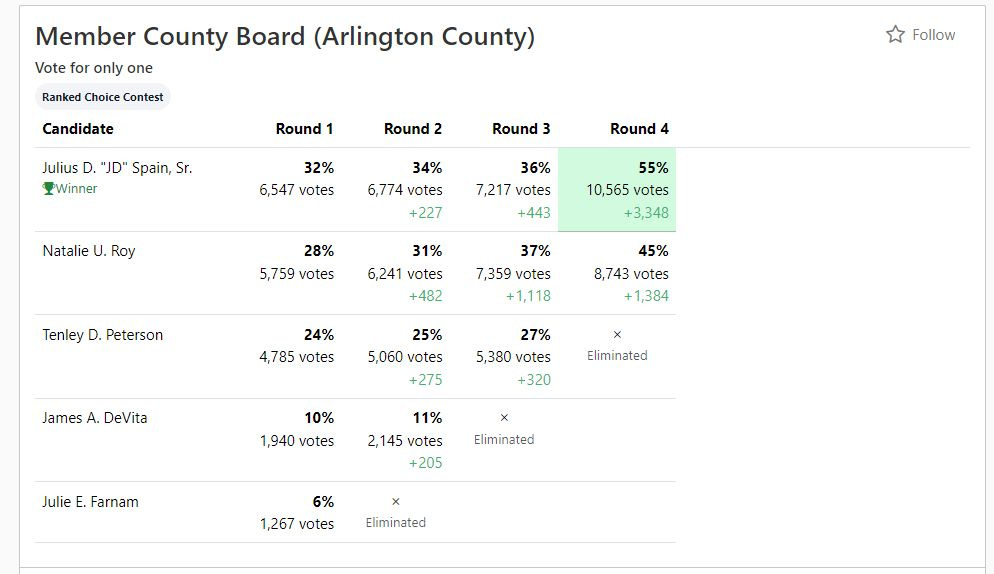
Muir said there is an effort in Alaska to repeal ranked-choice voting, but that system pertains to statewide elections and is more expansive than current law in Virginia which allows localities to decide for themselves if they want to use the mechanism for local races. Visit Ballotpedia if you want to learn more about the repeal effort in Alaska.
The head of one student organization at UVA said ranked choice voting appeals to younger voters who do not seem themselves represented.
“[Ranked-choice voting] brings more diverse voices into the conversation to ensure that everyone sees a role for them in our political process,” said Eli Weinger, president of Students for Equity and Reform in Virginia. “Put simply, RCV ensures that there are more voices and more choices.”
Presentation from the Director of Elections
The first time of regular business on the Supervisors’ agenda was a discussion of ranked choice voting.
“We want to hear about the capabilities in Albemarle County regarding ranked choice voting including costs, timing requirements to implement personnel requirements, as well as other resources and information required from the county or the state legislature, voter education efforts relating to any future decision,” said Jim Andrews, the Samuel Miller District supervisor and current board chair.
They first got an update from Lauren Eddy, Albemarle’s Director of Elections. The last briefing Supervisors had from her was in November 2022 as I reported at the time. She explained the county would need an election system that could record the ranked choices on a ballot, export the data to a “cast vote” record, and tabulate the results of multiple rounds. (view Eddy’s presentation)
“Our current election system still meets only the first requirement,” Eddy said. “We have plans and the budget, thank you guys, to purchase new ballot scanners in January of 2025. This new equipment will still only meet the first requirement, though.”
Eddy said there is an add-on offered by the election system vendor that would allow the ranked choice ballot to produce the necessary cast vote record. Eddy said the cost to buy the new software would be $13,626 with an annual fee of $7,200.
Additional software would need to be installed to meet the third requirement, and Eddy said the Virginia Department of Elections now provides that service to localities.
But the director of elections said the biggest need will be in training people to use a new system.
“What we feel is the biggest requirement of ranked choice voting will be voter education,” Eddy said. “Voter education is the key to the success of ranked choice voting elections. The law currently requires that we would start a voter education campaign at least 60 days prior to an election that we’re going to use ranked choice voting in.”
Eddy said a voter education campaign that sent a postcard to every citizen would cost $40,000 at a minimum. She also said she would need a dedicated employee to train the public and other staff on how to use the system.
“Right now we are a staff of five full-time people who are stretched to their limits with the number of elections and the number of voters that we have in the county so we would definitely need to add some manpower to help us educate the voters and educate ourselves,” Eddy said.
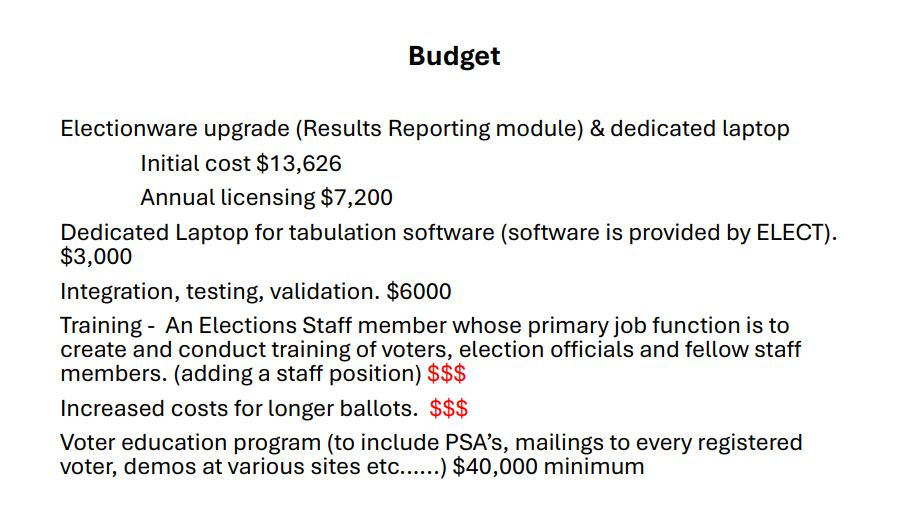
Supervisor Ann Mallek asked Eddy if people were required to vote for more than one person when given a ranked choice ballot.
“They would not be required to,” Eddy said.
“So their ballot if it came with just one person per race would be completely acceptable and be scanned in as normal?” Mallek asked.
“To my knowledge, yes,” Eddy responded.
“One thing that’s been out there is that people would have to vote for all these other people that they don’t know or don’t want so I wanted to get that clarified right away,” Mallek said.
Mallek also pointed out that unlike Arlington and Charlottesville, Albemarle elects candidates by magisterial district which would add more complexity by having more ballots to count.
Scottsville Supervisor Michael Pruitt faced no opposition in either the 2023 Democratic primary or the November 2023 general election.
“A critique we have heard from folks in the audience and via email is that we aren’t actively experiencing elections that have a need for ranked choice voting because there’s not enough people running for them,” Pruitt said.
That prompted him to ask if some of the necessary purchases could be phased in over time. Eddy responded.
“My preference would be that if the Board was going to adopt ranked choice voting and implement it that my office was set up with everything that we would need to move forward with it,” Eddy said.
Supervisor Bea Lapisto-Kirtley has been elected twice to the Rivanna Magisterial District and both times faced opposition in the General Election. However, in 2019 that came in the form of a write-in campaign and a candidate who got a third of the vote.
“Write-ins will be… they don’t be part of the ranking process unless that one person writes someone’s name in and then puts them in the ranking order, correct? LaPisto-Kirtley asked.
“Yes,” Eddy said.
There has been one successful write-in campaign in Albemarle’s history back in 1993 when Sally Thomas defeated Carter Myers 2,238 votes to 2,046.
Electoral Board opposition
After Eddy’s presentation, the chair of the Albemarle Electoral Board spoke to outline her opposition to a switch to ranked choice voting.
“We are a unique group in the fact that we are appointed by a Circuit [Court] judge and we have three year terms and we report to the state election people,” said Sylvia Flood.
Despite being appointed through a partisan process that allows the governor to choose members of their own political party, Flood said they do their job on a neutral basis that represents everyone.
“My job is administrative,” Flood said. “My job is apolitical. I cannot personally or in my position as chair of the electoral board cite a position from that podium.”
However, Flood said from an administrative point of view, she has questions and concerns about implementing ranked choice voting. She then ceded her time to fellow Republican Clara Belle Wheeler to give a presentation about a hypothetical election for one seat with 1,000 voters. (view the electoral board’s presentation)
“The highest vote-getter got 31 percent of the 1,000 ballots,” Wheeler said. “Under the rules of ranked choice, in order to be declared the winner in a ranked choice election, you must get 50 percent plus one vote.”
That would require a second round of counting where the candidate who comes in last would be eliminated and their votes would be redistributed to others still in the race based on the ranked choices. This would continue until the majority threshold was met.
However, Wheeler said people who decide not to rank additional candidates would be dropped out of the counting. In this hypothetical situation, the result is based on 680 ballots.
“If you do not vote all of the choices, your ballot will be eliminated and no longer part of the election,” Wheeler said. “In ranked choice voting, you must vote for everybody on the ballot and it may be somebody you don’t like. But in order to keep your ballot alive you’ve got to vote for all of the choices.”
Wheeler said another issue that only the first round of voting will be known on election night, and the winner of that round may not be the ultimate victor.
“The consensus opinion from the Electoral Board and as you’ve heard from others is that, and as you know, many of you have run unopposed,” Wheeler said. “You don’t need ranked choice voting for your magisterial district. Albemarle County routinely has no more than two at the most, three candidates and you can declare a clear winner with three candidates in a race. Frequently there’s only one candidate. Having a ranked choice voting will be expensive, confusing, and there’s no real need for it.”
A look at recent history
Let’s look back at Supervisor races the last two dozen years or so going back to 1997. This information is about the general election and not how parties selected candidates.
Jack Jouett District: Charlotte Humphris ran unopposed in 1997 for her last term in office. There were two new candidates on the ballot in 2001 which resulted in Dennis Rooker being elected. Rooker ran as an independent and won re-election against a Republican candidate in 2005. He was unopposed in 2009. In 2013, Diantha McKeel ran as an independent and won with nearly seventy percent of the vote against another independent. She ran unopposed in 2017 and 2021.
Rio District: David Bowerman ran unopposed in 1997 but had a fellow incumbent on the ballot in 2001. There was a three-way race for this district in 2005 won by Democrat David Slutzky. In 2009, Slutzky was defeated by Republican Rodney Thomas. In 2013, Thomas was defeated by Democrat Brad Sheffield. Democrat Ned Gallaway ran unopposed in 2017 and 2021.
Rivanna District: Independent Charles Martin ran unopposed in 1999. Republican Ken Boyd defeated Democrat Peter Hallock in 2003 with 52.56 percent of the vote. Boyd also won in 2007 against Democrat Marcia Joseph with 51.57 percent of the vote. Boyd defeated Democrat Cynthia Neff in 2011 with 56.57 percent of the vote. In 2015 there was a three-way race and Democrat Normal Dill won with 48.3 percent of the vote to 45.6 percent for Republican Richard Lloyd and 6.1 percent for an independent candidate. Democrat Bea LaPisto-Kirtley won election in 2019 against a write-in candidate and defeated Independent T.J. Fadeley in 2023 with 60.74 percent of the vote. That last is from my original reporting as the Department of Elections doesn’t have that info in their historical records yet.
Samuel Miller District: After winning a write-in election in 1993, Sally Thomas ran unopposed in 1997, 2001 and 2005. Republican Duane Snow won election in 2009 in a three-way race. Snow was defeated by Democrat Liz Palmer in 2013. Palmer defeated Republican John Lowry in 2017 with nearly 68 percent of the vote. Democrat Jim Andrews ran unopposed in 2021.
Scottsville District: In 1999, Lindsay Dorrier defeated Terry Hawkins with 60.75 percent of the vote. Dorrier ran unopposed in 2003 but fended off two other candidates in 2007 with 55.73 percent of the vote. Democrat Chris Dumler beat a Republican candidate in 2011 with nearly 54 percent and would later resign after pleading guilty to a misdemeanor sexual battery charge. In 2013, Democrat Jane Dittmar won in a special election against a Republican and received 57.72 percent of the vote. Democrat Rick Randolph got 57 percent in 2015 against Republican Earl Smith and Democrat Donna Price defeated Republican Michael Hallahan in 2019 with 55.2 percent of the vote. Democrat Michael Pruitt ran unopposed in 2023.
White Hall District: In 1999, independent Walter Perkins defeated another independent for his fourth and final term. Four years later, Republican David Wyant beat Democrat Eric Strucko with 54.42 percent of the vote. Democrat Ann Mallek won against Wyant in 2007 with 55.64 percent of the vote. Mallek was unopposed in 2011 and 2015 but had challengers the next two cycles. In 2019, Mallek received 56.7 percent against Republican Steve Harvey and in 2023 she won around 52.5 percent of the vote. That last is from my original reporting as the Department of Elections doesn’t have that info in their historical records yet.
Supervisors response
Supervisor Mike Pruitt took issue with much of the presentation Wheeler had made and said he was disappointed by what he felt was a partisan nature.
“This is a body that while partisanly appointed has a directed duty to behave in a non-partisan manner and it was also presented pursuant to an invitation from this body, from this board, to present the requested input on the concrete demands for ranked choice voting and expressly not on the normative, policy, or political considerations that went into ranked choice voting,” Pruitt said.
Wheeler said she felt attacked by Pruitt’s comments.
“I take great exception to your accusation that I am acting in a partisan way,” Wheeler said. “I am not. I presented data to you. I presented pictures of ballots so you could know how the counting takes place.”
Chair Jim Andrews invited the Democrat on the Electoral Board to offer his comments. He was brief.
“As you know, part of this is meeting is because the code says, in Dr. Wheeler’s slideshow, that you are to make your decision in consultation with the electoral board and the registrar,” Heilman said. “We have a difference of opinion on the electoral board about what ‘in consultation’ means and in my way of thinking it does not mean that we should tell you or advise you that it is a good idea or a bad idea.”
Supervisors made no decisions about how to proceed and there will be future conversations.
Reading material for #722
Charlottesville council takes first step toward ranked choice voting, Meghin Moore, VPM, August 20, 2024
Charlottesville City Council increases salaries and considers ranked-choice voting, Catie Ratliff, C-Ville Weekly, August 21, 2024
For the first time since the pandemic, both Charlottesville and Albemarle County start the year with enough bus drivers to get all their students to school, Tamica Jean-Charles, Charlottesville Tomorrow, August 21, 2024
#722 will now fade into the archive
I had not intended to write as much as I did about the Ranked Choice Voting discussion in Albemarle, but suspect there will be not nearly as many articles written about the presentation to Supervisors as there will be about Charlottesville. Compared to Charlottesville, Albemarle is a news desert with much less coverage than had been in place maybe ten years ago.
I make an effort, but know that I’m barely scratching the surface writing about a community with over 112,000 people surrounding the City of Charlottesville. Both are connected to the growing University of Virginia, an institution with that is investing billions in new buildings such as the Manning Institute of Biotechnology and everything happening at the Emmet-Ivy Corridor.
My work as a journalist is based on the notion that people want information about what’s happening. I spend seven days a week providing what I can because I’m either stubborn or because I really do have passion for this role.
If you’re a paid subscriber, I very much thank you for doing so. If you are not one yet, I encourage you to consider doing so. It will help me plan for the future.
If you don’t want to become one because of Substack, drop me a line. There are other ways to contribute financially. If you don’t want to do that, but you still want this thing to grow, tell someone about the work!
If you do through Substack, Ting will match your initial payment.
They’ll do that at the $5 a month level, $50 a year level or $200 a year level. The latter will get you two shout-outs a month. It’s a bit of an innovative way to fund my work and I’m grateful to Ting for the opportunity which has been underway since sometime in 2021.
In return, I tell you that Ting can help you with your high speed Internet needs. If service is available in your area and you sign up for service, enter the promo code COMMUNITY and you will get:
Free installation
A second month for free
A $75 gift card to the Downtown Mall





